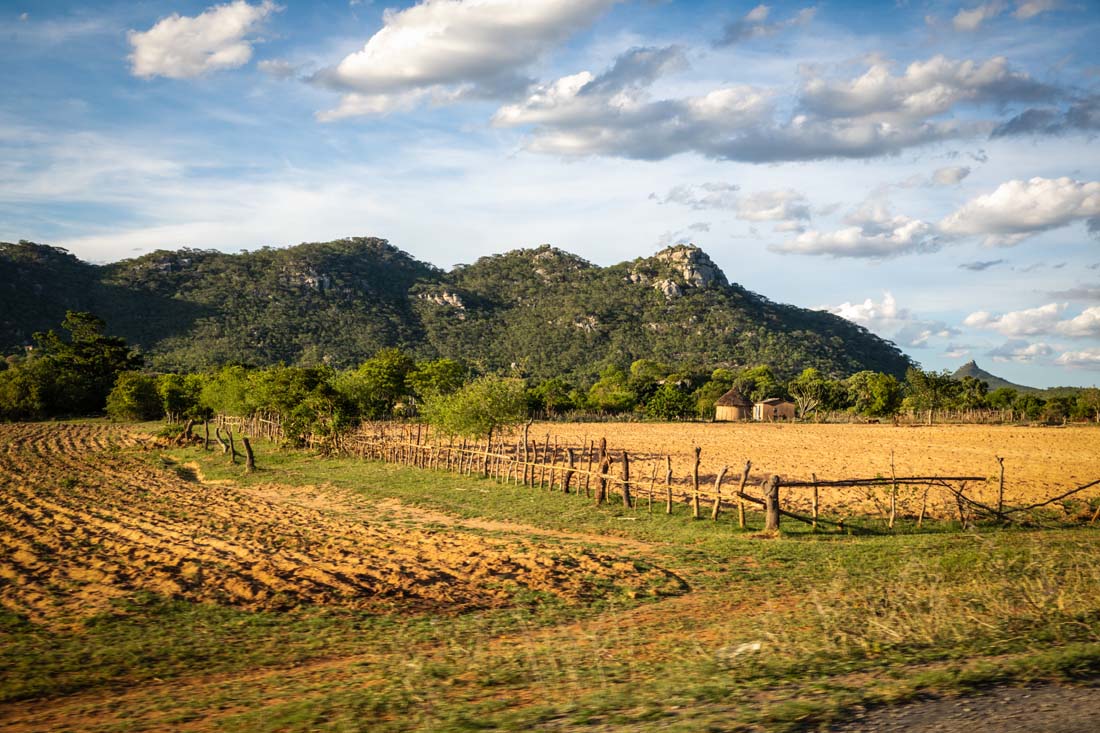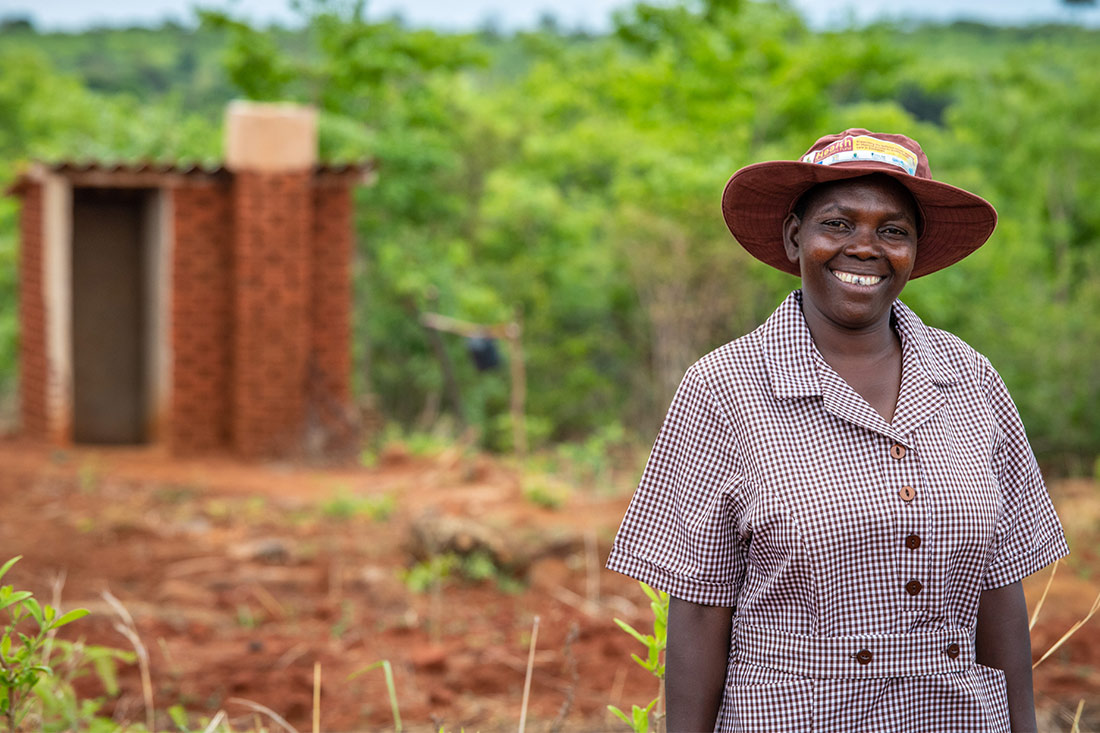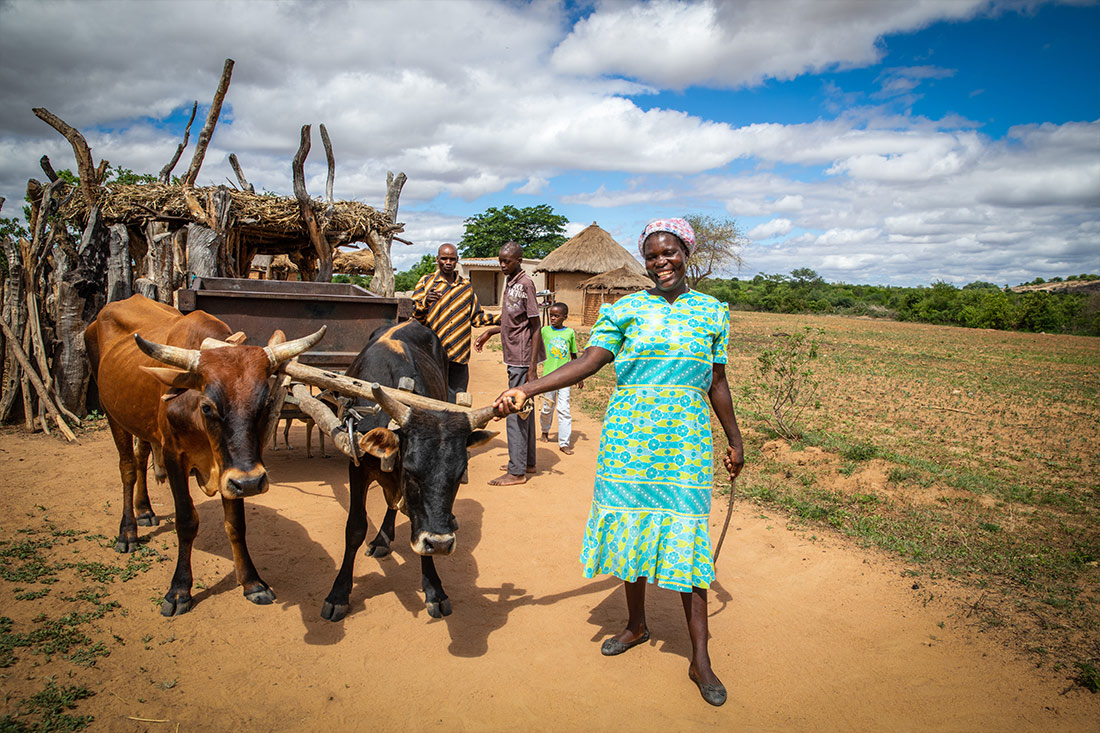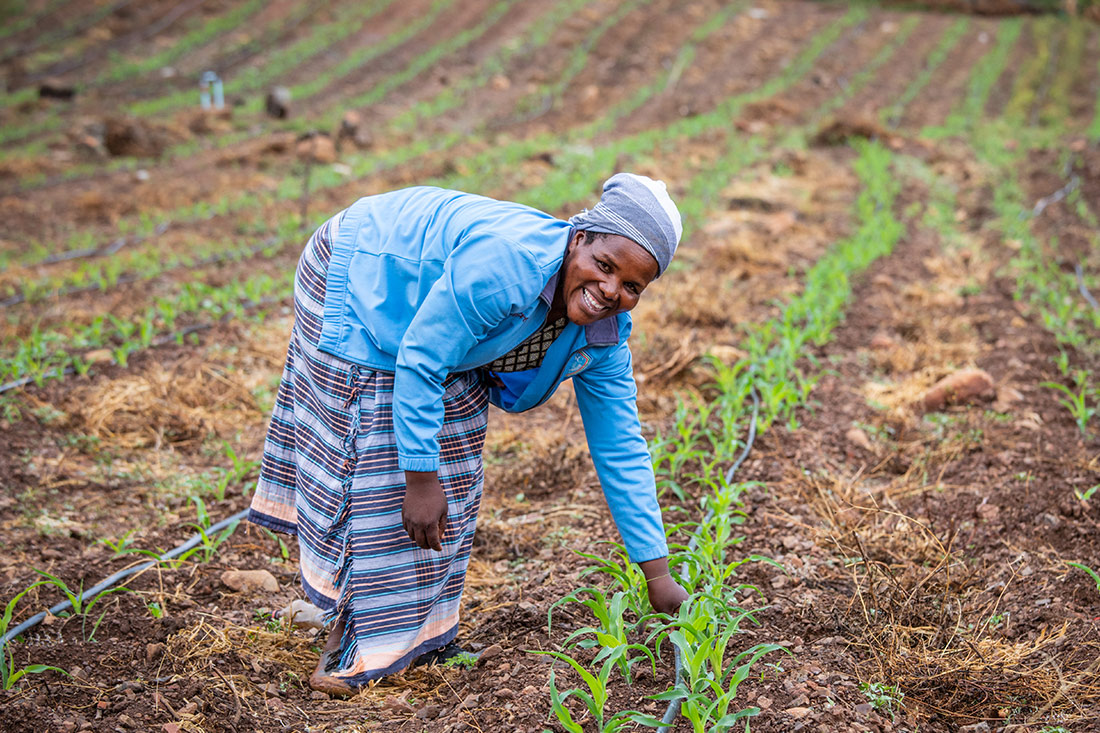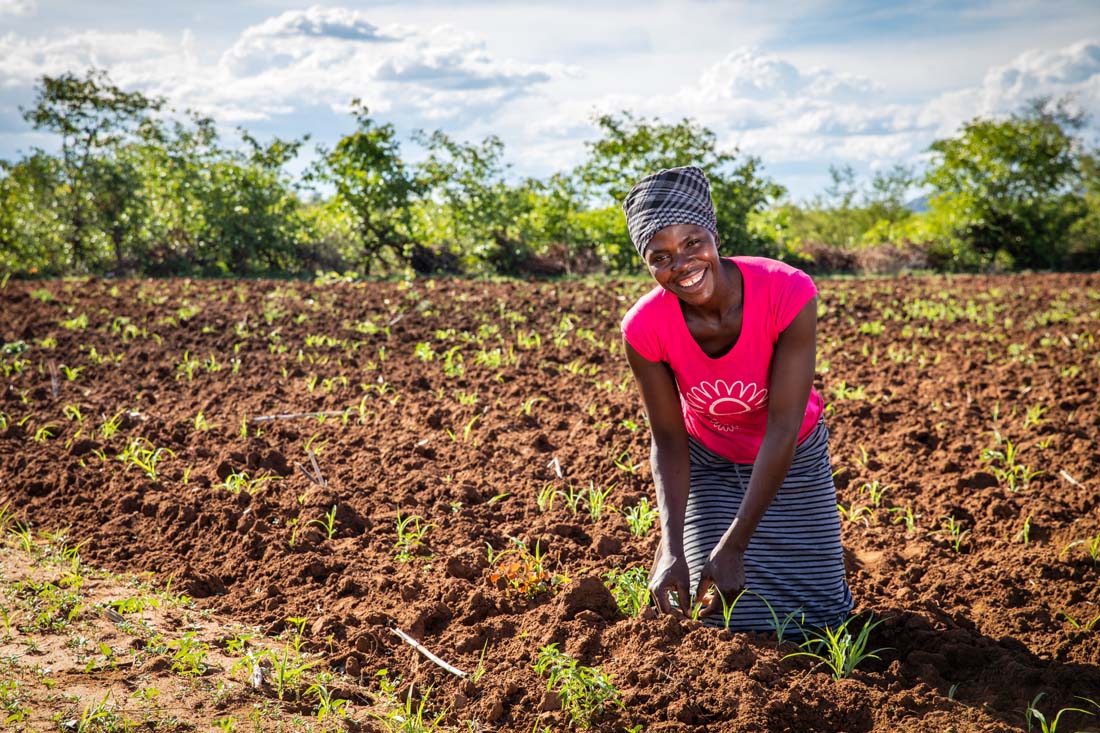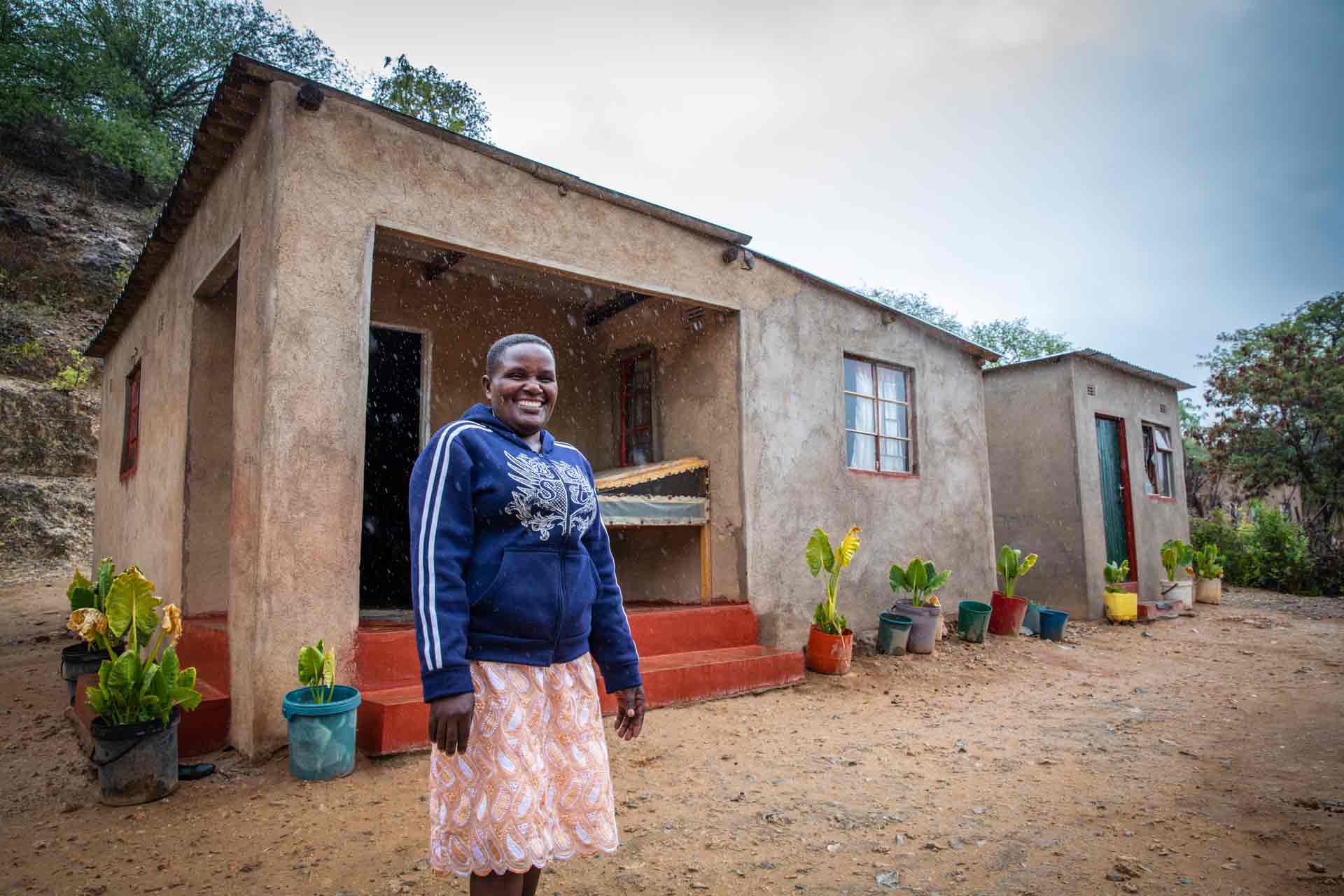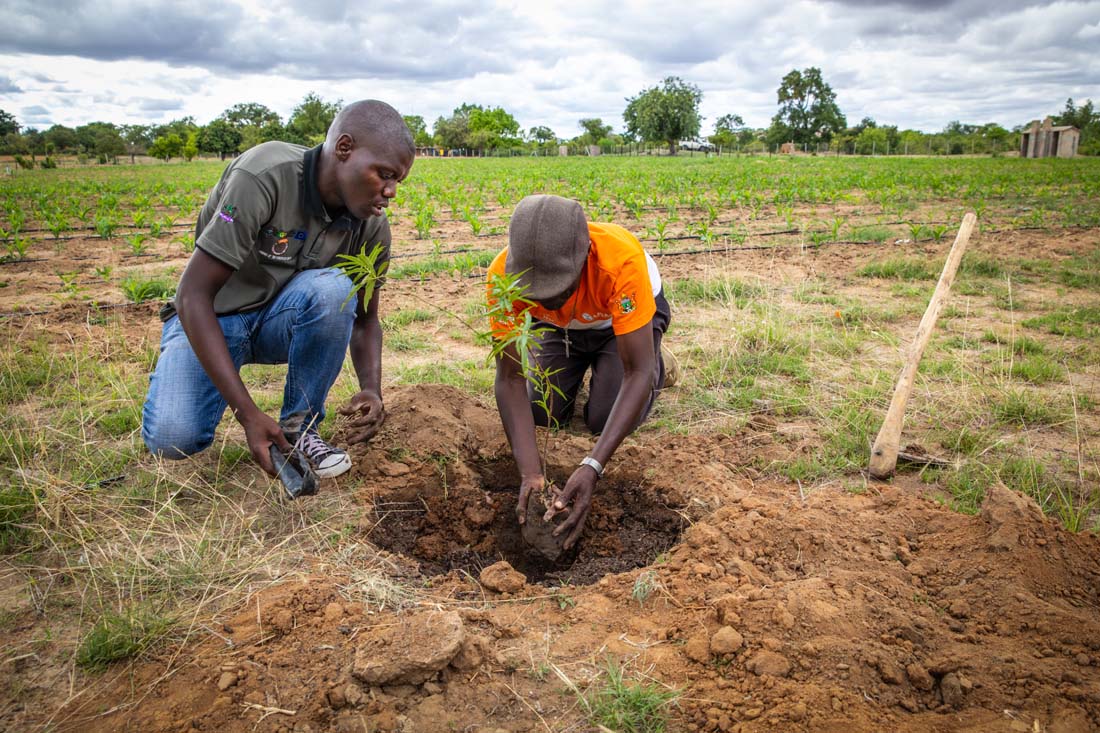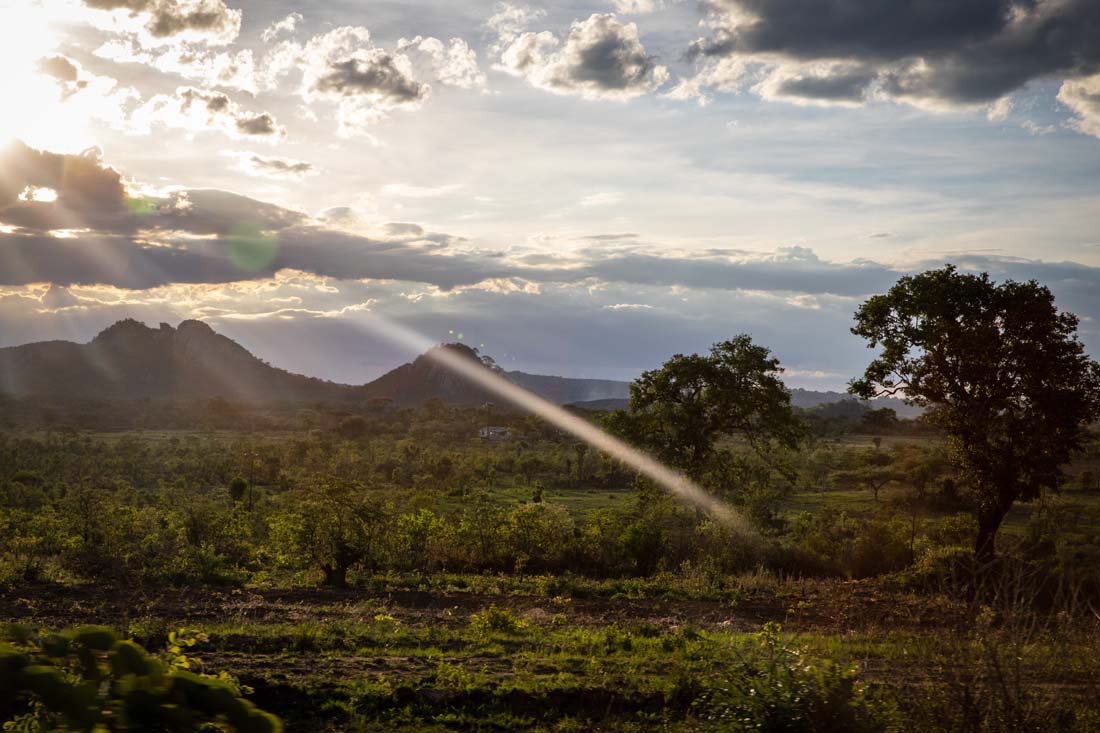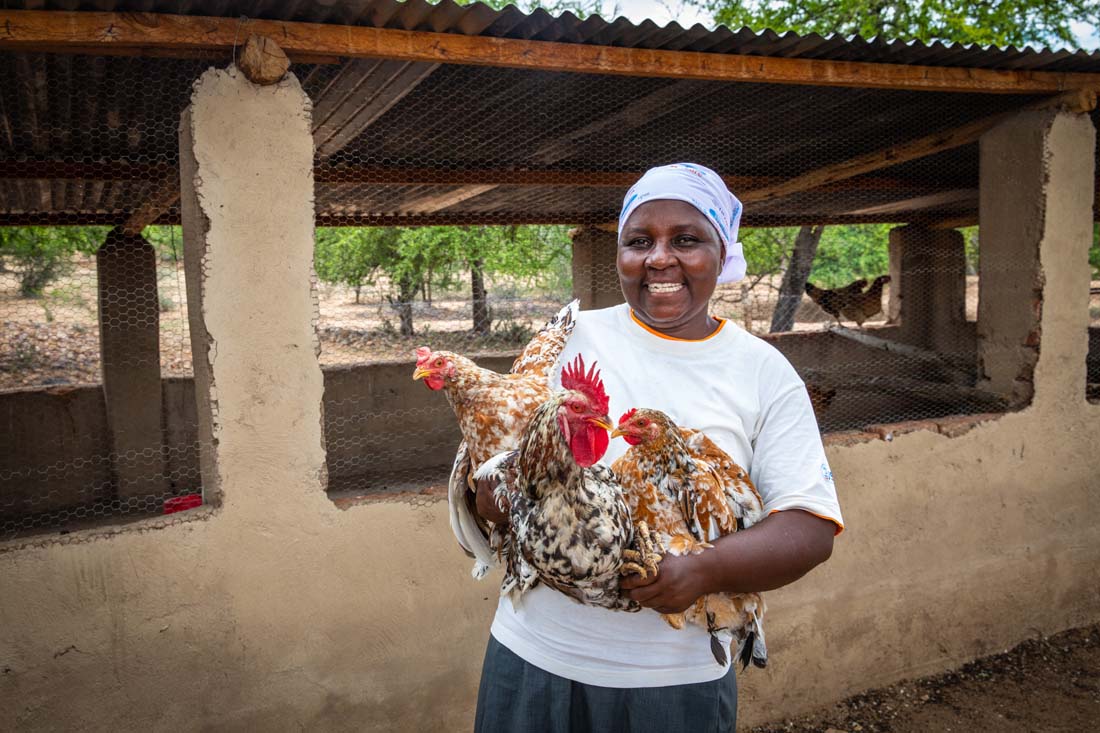
Woman grows from laughingstock to local leader in Zimbabwe
By Kristy J. O’Hara-Glaspie | Photos by Chris Huber
Every morning before the sun begins to rise, Susan Katsvata and her husband, Godfrey Bata, make the first 3-kilometer round trip to the closest borehole to fill their 210-liter water drum. Over the next three hours, the couple, along with one of their children, will make this trip four times, for a total of 12 kilometers (7.45 miles) of walking before the day has even truly begun. Then they’ll do it all again close to sunset, adding another 7.5 miles and three hours of work to the day.
It’s laborsome, but the need for more than 400 liters of water every day is also a sign of the family’s success despite the difficult conditions that surround them and their community. Susan, 48, and Godfrey, 55, live in the Chimanimani district in Zimbabwe’s eastern province of Manicaland. Throughout the past couple decades, farming has become increasingly challenging for so many community members like them.
“This is generally a dry area, and there are not good rains, so if people got good rains, they could grow their crops and not really struggle, but because there are no rains, that’s why I think people are struggling,” Godfrey says.
The family used to live off of sadza, a cornmeal-based porridge, and eat it with the few vegetables they could grow mixed with weeds they could find in the wild. To support their family of six kids, they would do casual labor to meet whatever immediate need they had. If school fees were due and came to $12, they would weed a plot of land that was equal to $12 worth of pay to get the needed funds — and nothing more.
“We were struggling, really struggling,” Susan says. “My firstborn, we didn’t manage to proceed with her education. She was very bright.”
That child, Melbamore, stayed in school until she was about 16, when she completed what’s called the ordinary level, where you must pass five out of eight subjects. Melbamore passed six. But then they couldn’t afford it anymore, so she had to drop out despite the promise she showed. Instead, she got married and started a family of her own in another community more than an hour away.
“It was very painful for me because as a parent, you’re supposed to be there supporting your child, and if you fail to give that kind of support, it makes you feel terrible about being a failure,” Susan says. “I would have wanted my daughter to go to college and get that advanced education.”
But six years ago, their lives began to change when World Vision introduced the ENSURE program. Funded by USAID, it aimed to increase food security and help build families’ resiliency through nutrition and livelihood programs. Families like Susan’s would never be the same.
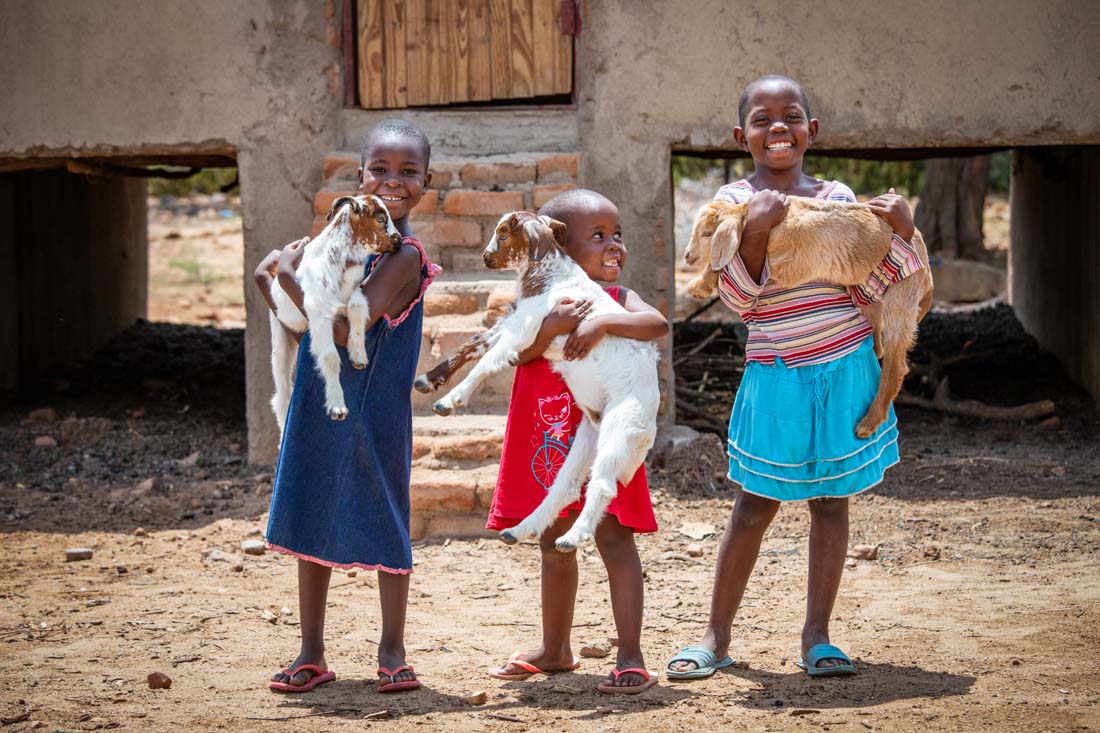
The first step
Frustrated by years of just getting by and feelings of failure as a parent, Susan was excited when World Vision started the ENSURE program. One of the first programs offered in 2014 was Village Savings & Lending (VS&L). In these savings groups, members collectively pool and loan money. Savings groups become a critical aspect of development because many people in rural communities don’t have access to formal banks, and even if they did, they don’t have the necessary collateral to receive loans from those institutions. As members need loans for expenses, they’re able to take a loan out from the group with agreed upon repayment terms, which allows them to grow their businesses, pay school fees, do home repair projects, and more. But when the concept was first introduced, many people were nervous.
“When it came, there was a lot of skepticism in the community,” Susan says. “There were a lot of people telling us, ‘This VS&L, you’re being told to raise your funds, and they will come and take your money away from you!’ We got scared a little bit, but we said, ‘No, let’s wait and see.’”
People laughed and scoffed at her when she began attending meetings. But she was ready for change and willing to take a chance. Like her daughter, Susan herself only completed the ordinary level of school, which used to be sufficient, but even with that, her life was now incredibly challenging.
“These days you can’t just rely on ordinary level,” she says. “You have to go to advanced level and university level because that’s what’s required these days.”
Even though her oldest daughter had missed the opportunity for higher education, she hadn’t lost hope that her other five children wouldn’t suffer the same fate, and she thought these programs could be the key to ensuring that they didn’t. Susan joined a savings group with six other people initially.
When a group forms, members create bylaws and decide how long they will save and grant loans before they have a share-out, when the pooled funds are then divided among members. Because loans generate interest through the period, and each member is regularly contributing, members generally walk away with significant funds and are encouraged to use their first share-out earnings to buy something significant that will serve as a reminder and encouragement to continue in the savings group and other programs. Susan used her first share-out funds to purchase a goat, but the most rewarding part of the process wasn’t what she had saved or the goat herself.
“That goat was under my name — Susan Katsvata,” she says proudly.
In their culture, women traditionally aren’t permitted to own things or property themselves. So when she saw the goat being issued in her name — not her husband’s — she couldn’t believe it, and she was overwhelmed with a sense of accomplishment. She also felt hopeful because she knew that goats reproduce quickly, so this one goat could be the beginning of change in her life.
“I was very happy,” she says. “I didn’t know how to even express myself!”
Six months later, at the end of the second savings group cycle, she was able to purchase a second goat. That was just the beginning.
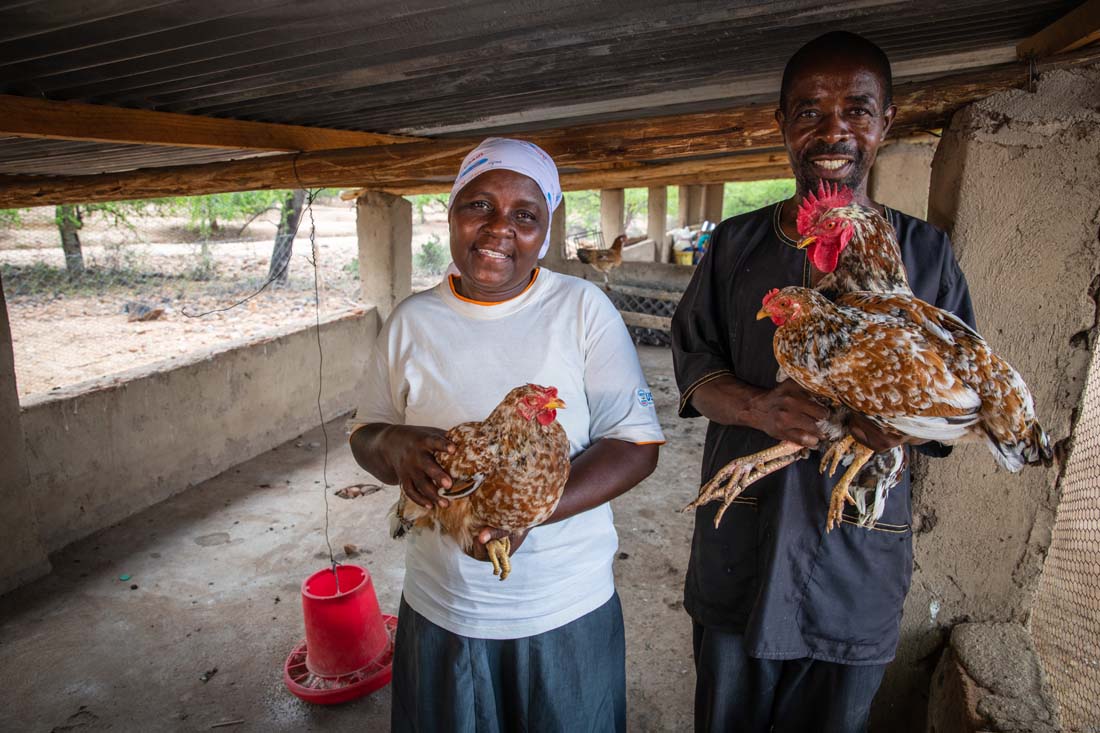
Raising chickens
One of the building block components of ENSURE’s program was building partnerships with market groups. ENSURE staff introduced program participants to an organization called National Organic Produce (NOP), which would provide a loan in the form of chickens to people who showed promise in egg production. ENSURE staff saw that Susan showed promise, so they recommended her to participate.
NOP gave her 50 chickens. They were hers to keep, but she had to pay for them by providing eggs until the value of the chickens was paid off. NOP also provided feed, but participants had to build their own housing and ensure it had the proper parameters so the chickens would thrive.
Initially when Susan received her chickens, three died, leaving with her 47, but she wasn’t deterred. She learned through the program that the ration of hens to cocks should be about five to one. She had 32 hens, so she felt she could be successful.
“If you raise them properly, in five months, that’s when they start laying eggs,” she explains.
She received her chickens in March 2016, and by October, they were producing eggs. She faithfully produced six crates of 30 eggs each. In her savings group, she was the second person to pay off her loan and was able to do it in 2017.
“After repaying the loan, I felt free,” she says. “Before the repayment of the loan, I wasn’t allowed to sell the eggs to anyone else because it was a contract. After repaying the loan, I could incubate the eggs myself and use other kinds of chickens.”
Now she could crossbreed the chickens if she wanted, and she could find other markets as well. She also could now sell eggs in her community.
She was then connected to Metbank, which was another partner of the ENSURE program. She could sell her eggs to NOP, and she would receive payment through Metbank in cash. With the money she made, she built a chicken run that can hold hundreds of chickens.
“It was very good for us to work with NOP and Met because we wouldn’t have had enough money to start the business on our own,” Susan says. “It was quite something for us to have a starting point.”
Across all the ENSURE program areas, the number of farmers with access to financial services grew from 14.2% to 27.5% during the life of the program. It was a game-changer for people like Susan.
“I don’t see how it was going to be possible if they had not brought us together,” she says. “If I had gone to Metbank or NOP, they would ask me where I was coming from,” she says, explaining that people in rural areas are often looked down upon or denied services. “They didn’t require collateral, and they trusted the relationship we had with ENSURE.”
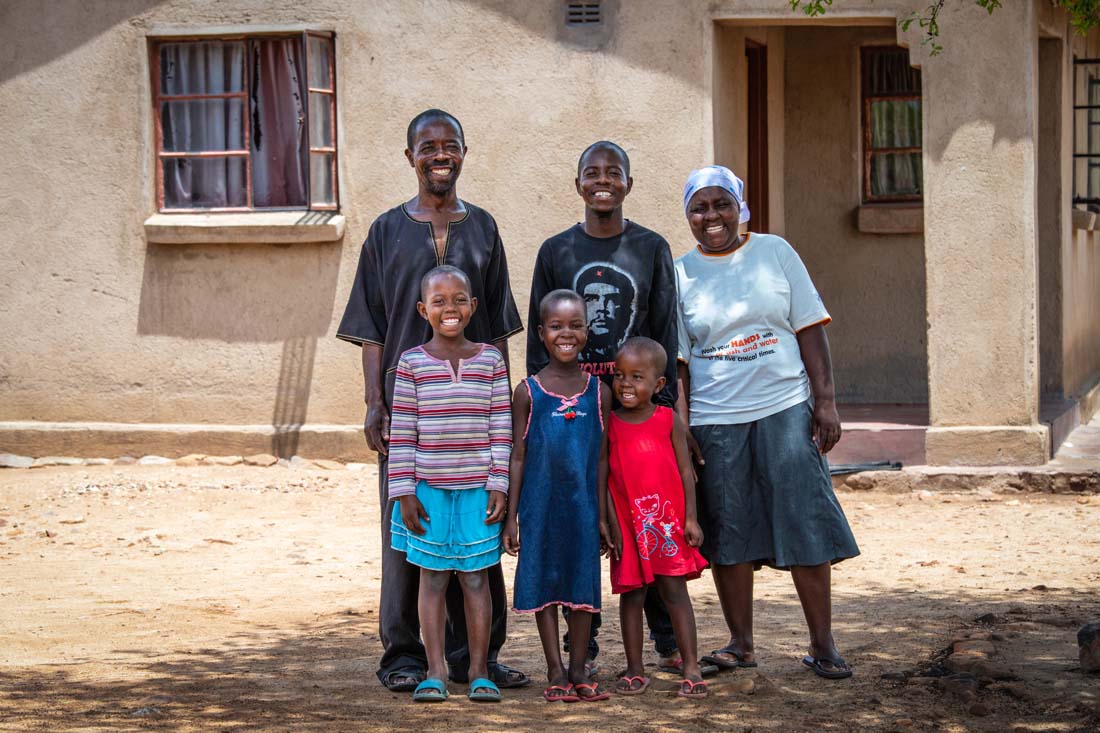
Better health
One of the key components of the ENSURE program is building on learnings and using groups to teach.
“The issues where people work together as groups and assure each other and move together, this is an approach that helped ENSURE succeed,” says Richard Ndou, who served as chief of party overseeing the entire program.
Staff encouraged Susan to also join a care group. She decided that it would be a good opportunity, and the community even elected her to serve as a care group leader. These groups of mostly women meet regularly to learn how they can better care for themselves and their children. They learn about how to feed their children in a way to ensure their little ones get the nutrients they need to grow up healthy. Women also learn about the importance of breastfeeding exclusively until their children are 6 months old. Susan’s daughter, Melcy, was the first child that Susan didn’t feed solids to as a baby.
“Usually you give your child porridge after a few days,” she says. She explained that with Melcy’s older siblings, that was the norm. “We were not educated on exclusive breastfeeding, so you know how it is when children are born — they cry. We didn’t know they were adjusting to the outside environment, so we would make porridge for them.”
Through the care group, she and the other mothers also learned that once they do start feeding their children porridge, they should mix other ingredients with it, such as eggs or vegetables, to provide more nutrients. Susan sees a marked difference in how Melcy, now 5, is growing compared to how her other children grew. And across all the ENSURE communities, the number of children under age 5 who are stunted decreased from 28.1% to 19.7% throughout the life of the program.
“If I could turn back the hands of time, I would do it the ENSURE way for all my children and make sure I add other things to my porridge to make them healthier,” Susan says.
The local health clinic held a contest, and Susan won a prize for being the mother with the healthiest looking child. They looked at the child, but participants also had to have their children weighed monthly to ensure they didn’t only look healthy.
“Because I had gotten educated on ENSURE, they would ask questions at the clinic, and I was able to articulate and answer their questions, and that’s why I won the competition,” she says.
She was awarded a hamper, bath soap, dish soap, peanut butter, matches, and toothpaste. But more than a prize, she had pride in how she was leading her family now and peace of mind that her children were truly healthy.
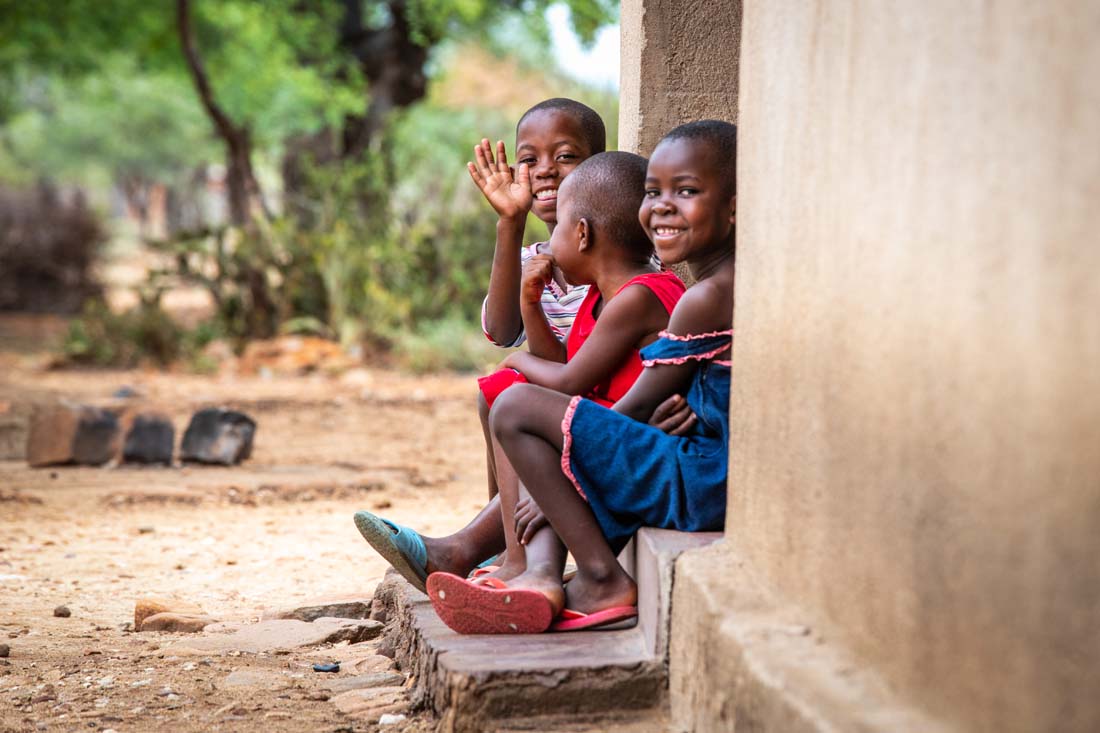
A new future
The family that used to survive on sadza now had more food options. Now, because of her egg business, Susan was able to add protein to her children’s diets. Eventually they tired of eggs and asked for something different. Some parents may have been offended, but not Susan.
“I was happy!” she exclaims laughing. “Because things had changed! My children could actually say no to eggs!”
Before, the family had no option to turn down food.
“My kids are actually saying no to food — it shows a level of achievement, and now I’m able to provide,” she says.
Susan also was able to grow her original chickens into about 300. While many died due to a quick-moving disease, she still has plenty and dreams of filling up the chicken run again once feed prices come back down. But she has seen far more success with her goats. Those two original goats that represented such a shift in her life have now reproduced into 43 goats.
“The same people who were laughing at us when we were doing this then came to us asking for advice for how to train them and how to do these projects,” she says. For example, if someone buys a goat, but it’s an inferior breed, she often will tell them to sell it and invest in a better breed that will be healthier or produce more offspring. If that’s not possible, she can crossbreed it with her superior goats to try to make the offspring stronger.
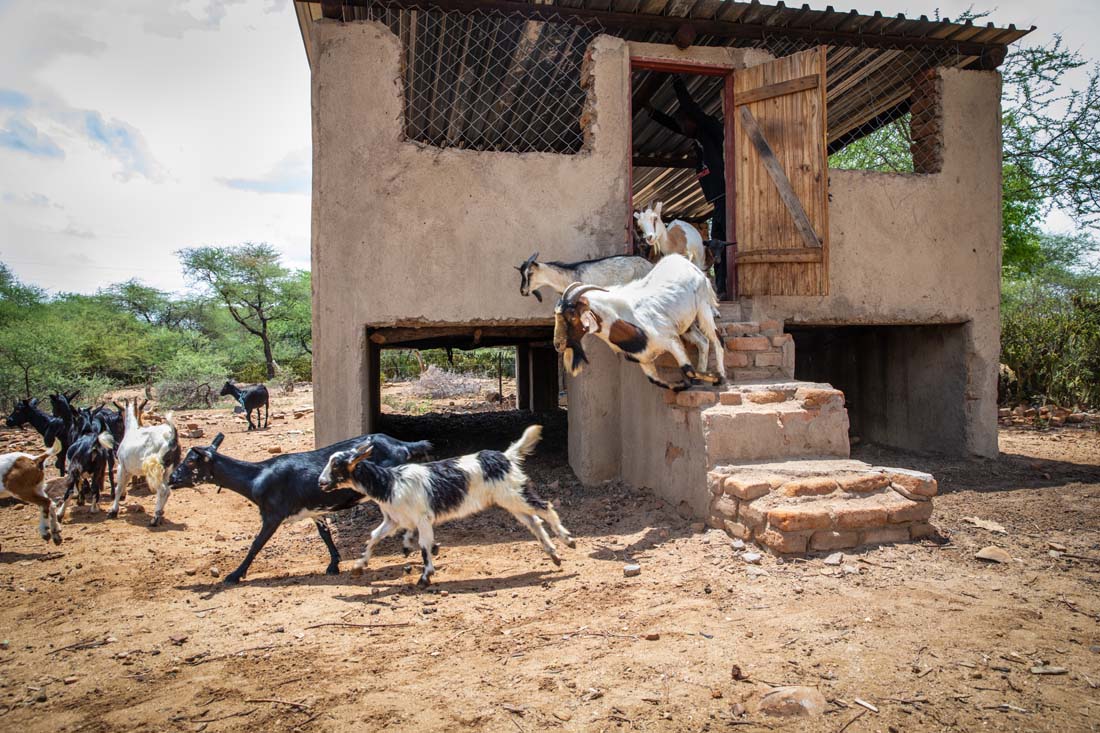
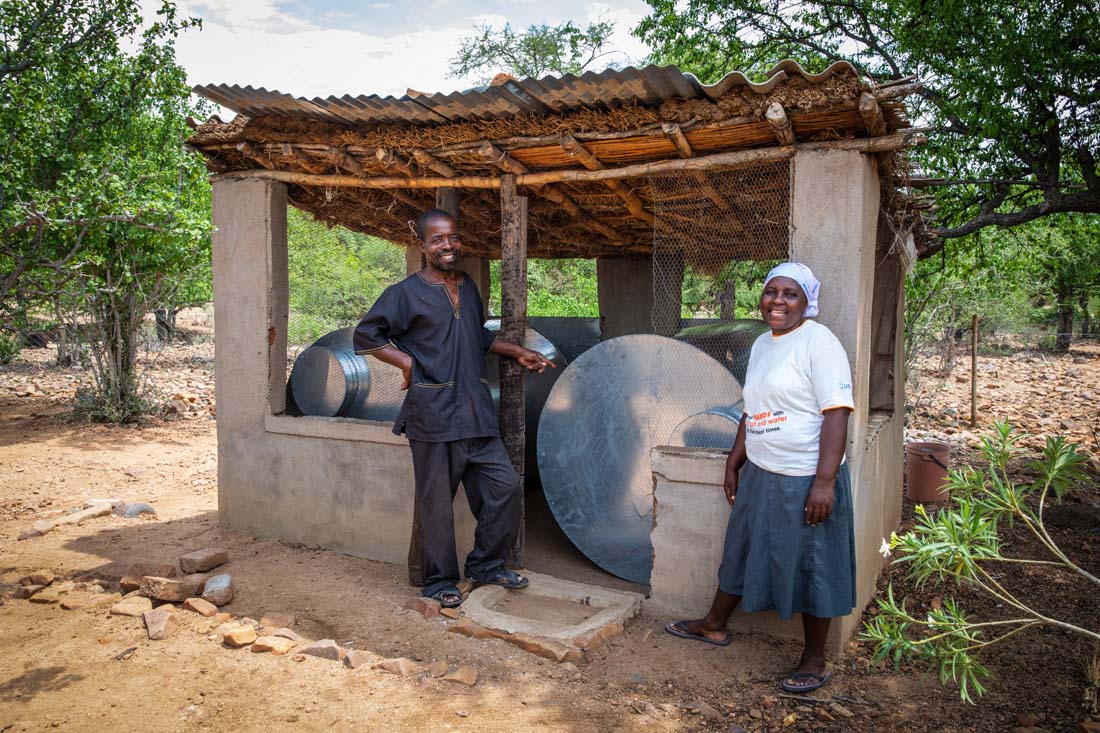
“People now listen to me when I talk. Usually people listen to someone who has some valuable assets, so they don’t just listen to someone who is poor, who has nothing, who is nothing,” she says. “They think they have nothing to learn from them. But now I have something, so people now listen to us.”
Other humanitarian organizations have noticed this as well. Susan has become the go-to person in her community, and she says that whenever a new group comes to town with other programs, she’s almost always offered the opportunity to be one of the first people involved because they see the success she’s had. For example, one group identified her to learn how to make metal silos for food storage. They sponsored her to go to Harare, the national capital about a five-hour drive away, for training in 2017.
“I was the only woman who went from this ward, and it makes me very happy,” she says. Making silos provides a significant source of income for the family at US$400 for a 1-ton silo and $200 for a half-ton silo. In 2018, she sold three of the larger bins and one of the smaller. Godfrey has been really supportive of her and this work, and Susan even taught him how to make them as well.
“I’m the happiest man!” he exclaims as he explains how proud he is of his wife and all she’s accomplished for their family.
He adds, “I feel very happy. I’m very proud of where my family is now because other families that didn’t join these programs are really struggling right now. … If I’m in need of money, I can sell my goats, but they don’t have goats to sell. I have an improved breed, so my breed fetches more money than theirs do.”
He participated in gender trainings through ENSURE and learned that supporting his wife’s endeavors wasn’t a sign of weakness but one of love and would help the whole family.
“We’re now more in love,” Susan says. “Not that we weren’t in love before, but our bond is strong because we understand these gender issues. My husband allows me to go away for these trainings because he understands that women can be empowered to do these things. He empowers me to go away for trainings. That’s something I’m proud of.”
With mom away, it could create havoc on the home front, but because of the gender trainings, Godfrey and the children care for the chickens and goats as she would. “They know we all survive because of them, so they are trained to do this project,” Susan says.
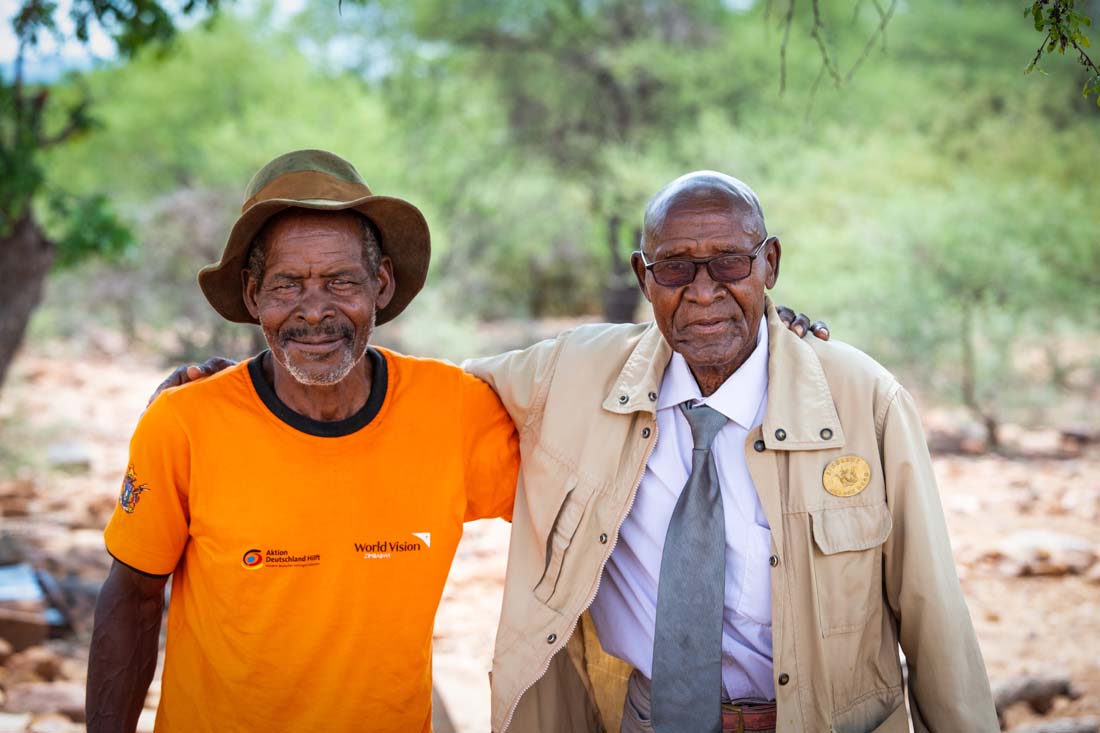
Gratitude
Susan and Godfrey’s incredible success now necessitates those long daily treks for water, but they see it as a reasonable price to pay for the food and financial security they now experience each day, and the walks inspire new dreams for their future. They hope that one day they can build a borehole on their property. That’s not outside the realm of possibility either, considering that across the ENSURE program communities, the number of homes with an improved source of drinking water grew from 44.2% to 52.7%.
“I would want a borehole that supplies me with water,” Godfrey says. “I see myself in the next five years with a lot of water. Carrying water for my goats with my head will become too much. To care for my household and my livestock, if I had a borehole nearby, it would be easier. If I had a borehole, I could do a garden or agriculture here at the homestead.”
Robert Mhuka, 66, is the village head. He’s too familiar with the challenges that affect so many of his community members, but having witnessed Susan and Godfrey’s transformation throughout the past six years, he is quick to sing their praise.
“This household is a typical example of the achievements ENSURE made,” he says. “You can see the chickens, the goats, the improved breed. Those who didn’t join are now wishing they had actually joined because of these achievements we are seeing now.”
Like Susan and Godfrey, Robert also dreams of more for the whole village. He hopes to install solar-powered boreholes to provide more water access points. He also hopes that ENSURE will return with another phase and help them create an irrigation solution that will solve the rainfall problem that continues to worsen and create food insecurity issues. One of Robert’s ward representatives is Obert Muzviziyi, and he has a passionate message of gratitude paired with need.
“You must not end today. You must continue the projects and helping others,” Obert says. He appreciates the commitment and follow-through that has been shown the last few years. “… When people say they will come help us, we can see you are here. We know World Vision’s staff are not lying and that we will receive funding from people far away. Thank you very much. Keep up the good work!”
As their children play and their animals roam freely, Susan and Godfrey can sit back and look around beaming. They can make plans for a different life, but they’re quick to thank the people who have helped them get where they are.
“ENSURE has changed my status in society,” Susan says. “It has changed my life. We have some challenges — rainfall challenges and economic challenges — but otherwise, my life has changed. I am happy because my life has changed.”
